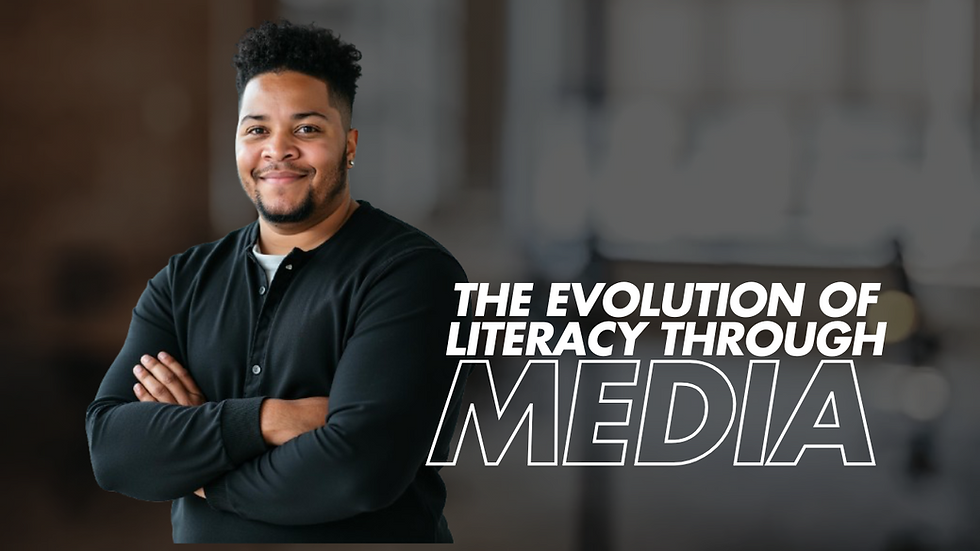The Evolution of Literacy through Media
- Desmund Ullrich
- Aug 16, 2025
- 3 min read

The landscape of education has evolved dramatically over the last century. While traditional literacy in reading, writing, and arithmetic was once sufficient for societal engagement, today’s complexities demand a new literacy: media literacy. This article examines the necessity of media literacy, the processes for engaging with media critically, and its role in shaping informed citizens in a media-saturated society.
In the past, foundational skills like reading, writing, and arithmetic served as the bedrock of education. These skills enabled individuals to navigate the world and understand its complexities. However, the exponential growth of information delivery systems, particularly through media, has reshaped societal interactions. Today, individuals are inundated with media messages that influence perceptions, attitudes, and behaviors. Understanding and critically engaging with these messages requires media literacy.
The Case for Media Literacy
Media literacy encompasses the ability to access, analyze, evaluate, and create media in various forms. It extends beyond traditional literacy by focusing on the delivery mechanisms of contemporary messages, from news broadcasts to social media platforms. The average person encounters over 5,000 media messages daily, many of which operate subconsciously, shaping cultural norms and individual beliefs. Without media literacy, these messages remain unexamined, leaving individuals vulnerable to manipulation.
The Media Literacy Framework
Media literacy involves a multi-step process:
Accessing Media: Access is the foundation of media literacy. From turning on a television to scrolling through social media feeds, individuals are constantly exposed to media. However, passive consumption limits understanding, as individuals often absorb messages at face value without critical engagement.
Analyzing Media: Analysis requires dissecting media elements to uncover their construction and intent. For example, in analyzing a Western film, viewers might explore character archetypes, musical choices, and narrative direction. Recognizing these components fosters a deeper understanding of the media’s implicit messages.
Evaluating Media: Evaluation combines analytical findings with personal and societal values to assess the significance of media messages. For instance, questioning the racial and gender representations in historical Westerns reveals insights into societal norms and stereotypes of the era.
Creating Media: The ultimate test of media literacy lies in creation. By producing their own media—whether advertisements, films, or digital content—individuals apply their understanding of media construction, audience targeting, and messaging. This hands-on approach cements their literacy skills.
Implications for Education
Integrating media literacy into the curriculum is essential for preparing students to navigate a media-driven world. Teachers can use diverse media forms, including video games and social media, to engage students in relevant and relatable ways. Media literacy also encourages critical thinking over rote memorization, a shift aligned with 21st-century educational goals.
For example, history teachers might present an event from multiple media perspectives, prompting students to analyze biases and construct their own informed interpretations. This approach not only cultivates skepticism but also empowers students to navigate the media landscape proactively.
The Role of Media in Society
Media’s influence extends beyond individual consumers to shape collective cultural narratives. Its power lies in the ability to convey messages subtly through social cues, imagery, and tone. For instance, the choice of background music or a spokesperson’s accent in an advertisement can evoke specific emotions or convey sophistication.
By understanding these cues, individuals can decode hidden agendas, such as a deodorant commercial selling not just a product but also an aspirational lifestyle. Recognizing such tactics fosters resilience against manipulation and equips individuals to make conscious choices.
Media Engagement
As society continues to evolve, the ability to engage critically with media becomes increasingly indispensable. Media literacy empowers individuals to question, analyze, and create, fostering a more informed and participatory citizenry. In a world where media shapes culture and democracy, educators have a responsibility to cultivate these essential skills.
The journey toward media literacy begins with a commitment to active media engagement and critical questioning. As educators and learners embrace this journey, they contribute to a society better equipped to navigate the challenges and opportunities of the digital age.




Comments